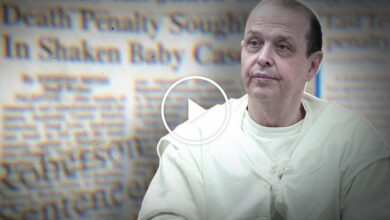
I’d like to remind Mr. Walters that the Montgomery County Public School System in Maryland tried a similar mandate in 1973, but it met such a backlash that the multitudes of Bibles that were ordered had to be returned to the book depository.
As a high school English teacher in Montgomery County, I personally relished the thought of teaching a unit called “The Bible as Literature.” I remember preparing my unit with poetry, metaphor, irony, proverbs, anthologies, redactors, allegory, hyperbole, parables, letters, satire, symbolism, prophecy, personification, wordplay and puns. The Supreme Court in 1963 ruled in Abington School District v. Schempp that religious texts used in classrooms cannot be used for religious purposes. My unit would have taught the Bible like any other book — as a product of the human mind produced by real people who lived in actual historical times, not that it was written under the direct inspiration of God and given to humans as a guide to their faith and conduct. But all my preparation was to no avail because of outrage, protests and objections from parents and even religious institutions.
While the intent of Oklahoma’s initiative might be applauded by some, I think the state’s Education Department should consider the practical implications of Mr. Walters saying “every classroom in the state will have a Bible” and “every teacher” will teach from it. Mr. Walters needs to consider the costs to the state and the schools as well as the usefulness in classes such as physical education, physics and geometry. Will the Bibles sit there unused and eventually be remanded to the warehouse like ours were? Will curriculum writers scratch their heads looking for inoffensive ways to incorporate the Bible in innovative ways? Mr. Walters and his office should consider what we Maryland educators went through so they don’t repeat our past and spend considerable time, money and effort on an initiative that will eventually fall by the wayside.
Kathy A. Megyeri, Washington
Ryan Walters made the rounds defending his policy mandating that Oklahoma public schools teach the Bible, including the Ten Commandments, because it is a “necessary historical document” as he said at a State Board of Education meeting last month. In his announcement, he said his team found “major points in history that refer to the Bible.” He referred to the Mayflower compact and the Founding Fathers and then jumped to the Rev. Martin Luther King Jr. and the civil rights movement.
Mr. Walters shows his hand when he leapfrogs history. He shows it further when he marries his educational policy to his rhetoric, in which he often promotes Judeo-Christian values. For him, the values of America are synonymous with a particular theological understanding of Christianity, and the country’s ethical identity is instantiated in the message of the Bible.
But when we look at the record, America’s understanding of the Bible’s message is anything but univocal. In fact, one American’s “Judeo-Christian values” were often pitted against another. Influential Baptist minister Richard Furman was a Bible-believing Christian who used biblical arguments in defense of chattel slavery in 1822. David Walker was no less a Bible-believing Christian when, in 1829, he called for enslaved persons to take up arms and commit violence against their oppressors. In the early 20th century, John D. Rockefeller Sr. reportedly believed “give, and it will be given to you” (Luke 6:38), an attitude which Rockefeller displayed in both his philanthropy and pursuit of unfettered material wealth. Meanwhile, Christian ministers such as Walter Rauschenbusch argued for socialist policies in favor of public ownership and in criticism of the “fictions of capitalism.” King used scripture to expose the “triple evils” of racism, economic greed and militarism, but J. Edgar Hoover was no more averse to using scripture to justify FBI surveillance of King and discriminatory “law and order” politics.
It is undeniably true that the Bible holds an important place in American history. As a historian of religion, I, too, am concerned with upholding religion as a genuine agent of historical change. If Mr. Walters’s directive urged teachers to pay close attention to the role that religion played in history, I doubt there would be much pushback. I would vigorously defend such a policy. The issue is that his demands infer particular theological judgments about both the Bible and the United States. It also prioritizes a moral vision of the Bible that, as I pointed out above, is anything but self-evident. To assert that America is good because of the Bible, or that the Bible unambiguously points in a morally unified direction — toward liberty, toward democracy or toward a more just society — is to make a theological declaration, not a historical one.
In arguing for the importance of the Bible, Mr. Walters has rightly noted that Thomas Jefferson referenced a “creator” in the Declaration of Independence. Strangely absent was the fact that Jefferson literally took a razor blade to the New Testament, rearranging the teachings of Christ and excising the gospels of miracles and anything supernatural. In doing so, Jefferson kept what he saw as eternal truths by ridding the gospels of their context and contingency, all to make the story of Jesus more palatable to his Enlightenment proclivities. Jefferson liked the Bible — or at least the parts of the Bible that supported his preconceived worldview. It’s a curious thing, history.
Jacob Randolph, Oklahoma City
I am confused by the edict issued by Mr. Walters to require lessons on the Bible in public schools. Aren’t supporters of this measure from the same party as those who were so deeply alarmed at the prospect of sharia law in the United States?
This measure seems even more hypocritical (and unconstitutional) than the Louisiana requirement that schools post the Ten Commandments. Perhaps, in a show of fairness, these state officials could mandate the teaching of algebra in churches?
Larry McClemons, Annandale
Read More


